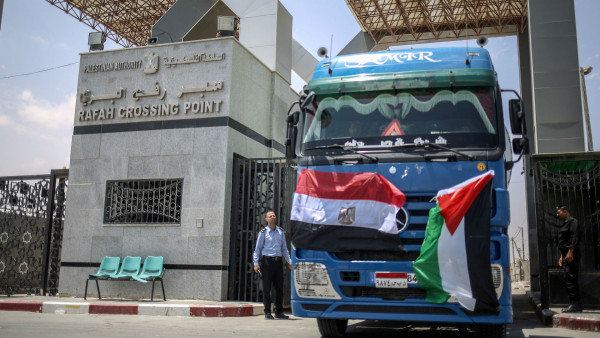The Rafah border crossing was the main point of entry for aid into the Gaza Strip [Getty]
The Israeli military’s takeover of the Rafah border crossing and its looming offensive in the southern Gaza city has seen a rift between Israel and neighbouring Egypt widen.
Egypt is one of the key mediators in negotiations between Israel and Palestinian group Hamas, aimed at a ceasefire in Gaza and the exchange of Hamas-held hostages and Palestinian detainees in Israel.
But Cairo has repeatedly warned Israel about violating the 1979 peace treaty; yet Israeli forces, for the first time since its pullout from Gaza in 2007, took control of the Rafah border crossing last week.
While many remain sceptical about Egypt cutting ties with Israel, which carried out a clear violation of the treaty with its Rafah incursion, it indicates rising tensions between the neighbouring states since the start of the Gaza war.
On Sunday, Egypt said it would join South Africa’s genocide case against Israel at the International Court of Justice, another sign of worsening ties.
Israel’s control of Rafah crossing ‘illegitimate’
The Israeli military on 7 May seized and closed the border crossing, which has been the main entry point for humanitarian aid going to the battered Gaza Strip since October.
Egyptian Foreign Minister Sameh Shoukry on Sunday called on Israel to “bear its responsibility for the closure of the Palestinian side of the Rafah crossing”.
But his statement fell short of actually warning to sever ties, saying the normalisation agreement with Israel “has been Egypt’s strategic choice for 40 years, and it has its own mechanisms…to investigate any violations, and deal with them”.
Egypt’s former foreign minister, Nabil Fahmy, believes that there is currently no room for coordination between his country and Israel, given Israel’s takeover of the Rafah crossing from Gaza’s side of the border.
He told Asharq Al-Awsat newspaper that Cairo would not accept any alternative to Palestinians administering the border on their side, as was the case before last week, adding that Egypt considers Israel’s control of the crossing to be illegitimate.
Fahmy also believes that Israel does not want to end the war in Gaza, pointing to the expansion of military operations in Rafah while negotiations were happening in Cairo.
He remains pessimistic that a truce can be achieved with Israel’s current approach.
‘Aid will only go through Rafah’
Tariq Fahmy, an expert in international relations, said Egypt would only send aid via the Rafah crossing and not other points, such as Kerem Shalom, due to Cairo being wary about being viewed as recognising the Israeli presence on the other side of the recently seized border crossing.
“This is the first Egyptian message [to Israel],” Tariq Fahmy said.
The head of the Egyptian Council for Foreign Affairs, Ambassador Mohammed Al-Orabi, also said Egypt was “keen for the continued flow of aid without Israeli obstacles”.
But he ruled out any effect from Egypt’s stance on the Rafah crossing on the ceasefire talks in Cairo.
Israel’s relentless, seven-month bombardment of the Gaza Strip has killed over 35,000 people, most of them women and children according to an official count by the territory’s health ministry. Thousands more are presumed dead beneath the rubble.
The war has pushed the enclave to the brink of famine, and the destruction of Gaza’s healthcare system and critical infrastructure such as water networks risks the spread of diseases, especially in crowded places like Rafah.


